Hackathons: Making a difference through Random Hacks of Kindness (RHoK)
What difference could you make in two days? This is the question asked on any given weekend in hackathons around the world. It is the same question I and a team of change makers, designers, and programmers asked ourselves at a recent hackathon event called Random Hacks of Kindness (RHoK).
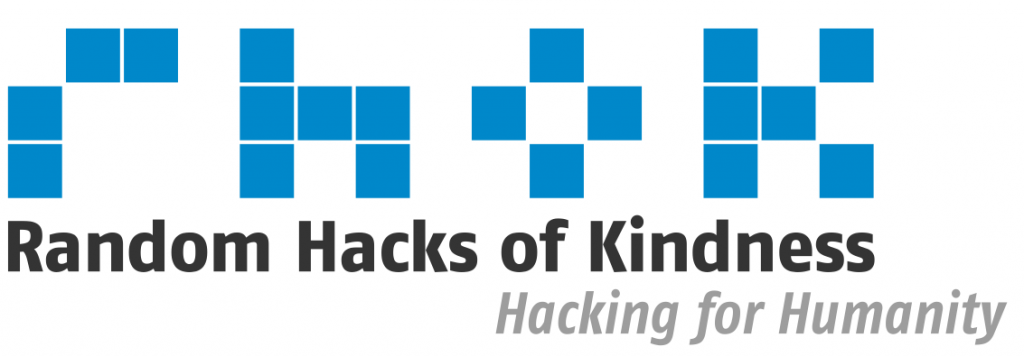
Hacking the hackathon
The term hackathon has evolved from its inception in the early 2000’s to encompass any event where you get people of different disciplines, typically but not always including programming, in one place to build something new in a short period of time.
Hackathons are not a new concept. The book The Medici Effect outlines how the Medici family of Renaissance Italy’s patronage gathered together accountants, artists, inventors, and scientists in one place. It was at this cross-section of disciplines that allowed innovation to happen. Technology now allows this “Medici effect” to occur in multiple iterations on a global scale.
Hackathons fill a need, like multiple mini-revolutions. The hackathon can be seen as a means to shake us out of our inclination for routine and stability. We are hard-wired to establish familiar patterns. Individual get into ruts, organisations develop bureaucracies, and societies create laws and policy to maintain order. These routines require the occasional “hack”, some new way of thinking and behaving that challenges the status quo.
A hackathon for any need
If the volume and popularity of events is any indication, Hackathons meet a growing, pent-up demand. The 2015 global hackathon in Seoul, South Korea is expected to attract over 2,000 hackers over four days.
The concept of a hackathons can extend beyond a weekend and apply to more than computer programming. The SunShot Catalyst Prize program is a 60-day four-stage program aimed at reducing the soft costs associated with the solar industry. University courses are using Markathons for marketing students to come up with new ideas. Legal professionals see a form of hackathon as a way to jumpstart their legal career.
Corporations are aware of the commercial value of getting people together to focus on their product. BMW’s Hack the Ride offered prizes of new cars for the best ideas and Qantas offers free flights for the team that best solves challenges for the airline. Infosys uses hackathons as a recruitment strategy to attract and identify global talent while Microsoft holds internal hackathons to drive innovation in the business. Angelhack focuses hacking efforts for a diverse range of commercial gain by connecting coders with various corporate ideas.
Owners of intellectual property such as Traitify’s personality assessment tool or governments in possession of open data hold Hackathons to identify the best way to use their data or frameworks. In addition to for-profit motives, corporations also see the hackathon as a way to channel their energies towards social outcomes such as NetSuite’s Hackathon 4Good charity competition.
Hackathons are also a means to develop talent. A program called JHack is helping to develop new skills in New Zealand. An alliance in India between the education and technology sector is seeking to build skills in regional areas. Targeted hackathons such as LadyHack aim to address the resilient gender imbalance in the technology industry.
While some hackathons focus on commercial outcomes, the usual focus is on addressing complex issues at the local community or global issue level. The state of Rhode Island holds hackathons to apply new innovations to community challenges. Oahu in Hawaii held the Reboot the Commute hackathon to address traffic problems on the island.
The non-profit OpenGov in the US is using hackathons to develop digital tools to fix the U.S. Congress. Hacking Health out of Canada addresses health care, Hack the Climate addresses climate change, and the Water / Energy Nexus Hackathon aims to address issues with the California drought.
The bigger and more complex the challenge, the more relevant the Hackathon. The issue of ISIS extremism is the focus for multiple groups in Australia looking at the broader challenge of extremist violence as well as the specific issue of recruitment of teens. Other hackathons bring all issues under one roof, such as Hacks for Humanity, Hack for Big Choices, and the event I attended Random Hacks of Kindness (RHoK).
Caveat to the hack
Any new form of organising will receive criticism, and hackathons are no exception. Below are some common concerns:
Building something new
Leading socially-minded technology provider Thoughtworks explains Why hackathons suck (and don’t have to). A main case they make is to look at what is already happening and try to tap into existing solutions. This is an important point – to leverage existing momentum and the power of many.
Many point to a perceived lack of long-term success coming from hackathon events. A caveat I would make is to strike a balance to allow for disruption that only happens when you try something completely new. In the RHoK I attended, we had three projects that built on existing platforms and one new startup from scratch.
The time and effort required
Other criticism comes from those who comment on the time commitment and challenges of finding childcare. These are valid in ensuring the opportunity to contribute is open to as many as possible.
However, there are two responses to the time and effort investment required. First, the total effort and challenge contributes to the shared experience. From a psychological perspective, the novel environment encourages new ways of thinking. Once basic security needs such as food and sleeping arrangements are addressed (and an allocation for on-site child-care is a great idea), participants can focus all their attention on the task at hand. Having previously conducted residential facilitations, the discomfort from working in such close proximity breaks down barriers and can be a critical aspect of innovation and personal growth.
Second, significant challenges will only be addressed by significant effort. If we do not focus our energy, we will never achieve the momentum necessary to alter our course. This can be very tiring for one person attempting to make change on their own. The concept of hackathons allow this focus to occur through a community who can support each other in overcoming individual challenges so we can address collective issues.
Solutionism

Solutionism refers to a tendency to think that complex challenges can be resolved through a simple solution. This is a valid criticism aimed at hackathons, as outlined in a great article on hackathons and solutionism by David Sasaki who works on Strategic Partnerships Initiative of the Bill and Melinda Gates Foundation.
I found myself echoing David’s concern throughout my own hackathon experience. Technology allows rapid solutions to a myriad of symptoms. I’m hungry, I can order something to eat. I’m tired, an app will tell me why. I’m overweight, an app will monitor my health. I’m bored, an app will occupy my attention. I want to learn, an app will educate me. I’m lonely, an app will find me friends.
We have many solutions to address our symptoms. I recently shared thoughts about concerns of a bigger, deeper issue when I asked:
How can we be successful in so many areas, yet seem fundamentally incapable of getting along? Within the challenges that face the world, such as poverty, violence, drugs, and corruption, what is the question we are not asking? What needs to happen, and why, after centuries of applying ourselves, have we not figured this out?
I do not believe that a single app or solution itself will address this challenge. What will happen, however, is that focusing attention towards the challenges will begin to globally shift the hearts and minds of more individuals towards addressing the challenge. One leader on the day of the hackathon said to me:
“Chad, it is like the story of the girl standing on a beach full of thousands of starfish dying in the afternoon sun. She bent down, picked up a starfish, and threw it in the water. An older man walked up to her and said ‘Why do you do this on a beach full of thousands of starfish? How can you hope to make a difference?’ The girl replied, ‘Yes, but it makes a difference to this one.’ That is a nice story, but imagine if we could get a thousand people on the beach throwing starfish.”
A RHoK experience
Events like Random Hacks of Kindness get more people on the beach and coordinate the collective starfish throwing efforts. RHoK has grown globally since originating in 2009 from a panel discussion in Washington, DC involving Microsoft, Yahoo, Google, NASA and the World Bank. In Australia RHoK now has a rapidly growing community membership of over 1,000.
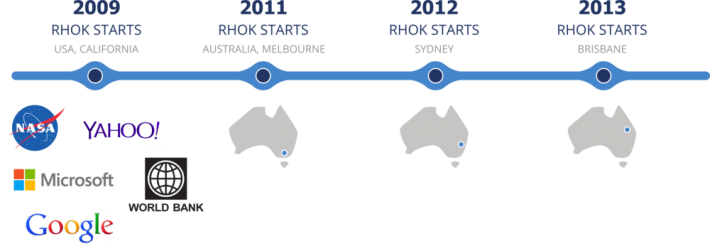
Part of the growth can be attributed to the consistent and clear approach. RHoK hackathon events are held every six months. Prior to each event there is an ideation night where ideas are presented and an information night to present the ideas and start the team-forming process. Following the event are RHoLL sessions where development can continue if the team is available.
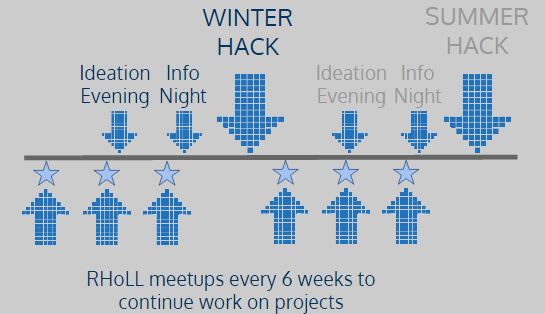
The teams begin forming on the Ideas Night. Each team includes a mix of skill sets. Some form of technical representation to build the idea is essential, but other roles are critical as well. We were fortunate in our team to have an iPhone developer, a Ruby on Rails developer for the back end administration, two designers / programmers, and a solutions architect. Skills are also spread across multiple people, in that a hacker may be the change maker, and a designer may be a community activist. The beauty of the event is that you have a room full of people asking the same question: “How can I help?”
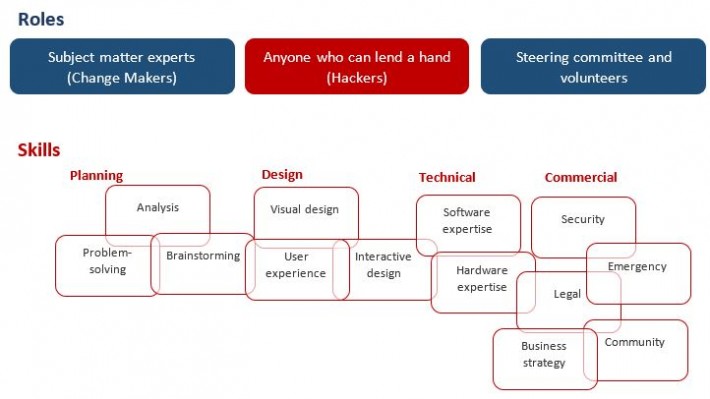
The projects
We had four projects to choose from. ThankBank, which I had some involvement with before the event, was a green-field project (nothing existed before entering the room). Another project was to contribute to the existing Missing Maps OpenStreetMap project which has hundreds of contributors globally. The other two projects, Gifts4Good and Pallitive Care Qld, were expansions on existing systems.

Gifts4Good is a shopping platform that makes it easy for you to contribute towards a better future with every purchase you make. The team built a browser plugin that allows non-for-profit to collect donations every time the user shops on a partner website, using the common referral fee.

Palliative Care Queensland is an independent non-profit peak body representing palliative care providers, consumers, their families and those with an interest in palliative care in Queensland. The team developed a search engine to change the way that people find and interact with palliative care resources in Australia and give easy access to services relevant to them and their situation.

ThankBank is a mobile app that rewards you for doing good deeds, starting with blood donations. Checking in gives 3 months of discounts and coupons to use. The team developed the first proof of concept for the app to allow check-ins and coupon redemptions.
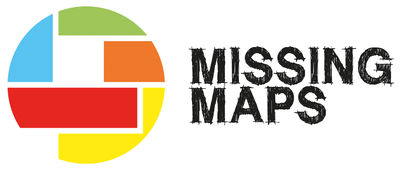
Missing Maps already allows users to map roads, rivers and villages in areas of the world where natural disasters occurs to help rescuers reach people in need. The team improved the interface to significantly boost the collective productivity.
The hack
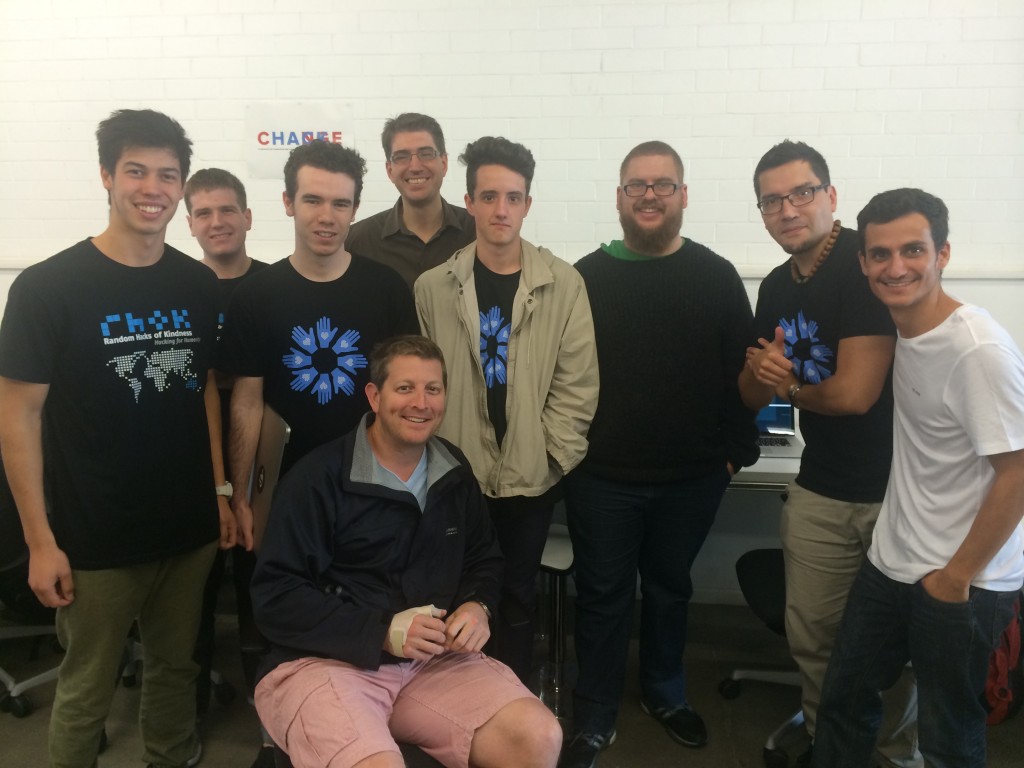
We had a fantastic time in the ThankBank team. Rather than a play by play, I will share a few of the take-aways from the experience:
- Rapid team building
What struck me most about the experience was how seamless it was to form a team around a common goal and deliver an outcome. There were no egos, just a focus on what needed to happen to get the project over the line. - Each person takes what they need
At the beginning of the project, I asked each team member what they wanted out of the next 20 hours. A team is only high performing if each individual member is better as a result of the experience. This means that if we want to be on a high performing team, we all need to ensure that everyone else realises their goals. - Focus on the Minimum Viable Product (MVP)
I suffer from a bad case of scope creep and “Wouldn’t it be cool if…?” The team was realistic about sticking to the minimum viable product. Even at that, we tried to get a function in at the end that meant we couldn’t quite get one validation done in time. In the short time, focus on the one thing and do it well. - Utilise all your time
There comes a point after designs and discussion that you just need to code. One of the designers took it upon himself to start in on a website refresh, another designer went to another team to give them a hand, a solutions architect started in on concepts for the next stage of the app, and the change maker and I sat down and prepared the final presentation and long-term strategy. We were able to deliver on multiple items in addition to the core application. - Conversations that matter
At a hackathon, you are in the room with like-minded people who are willing to sacrifice to make a difference. I value the conversations I had over the two days as much if not more than the products we delivered. As a few more conversations like that lead to action, there will be no end to the change we can make.
Your next steps
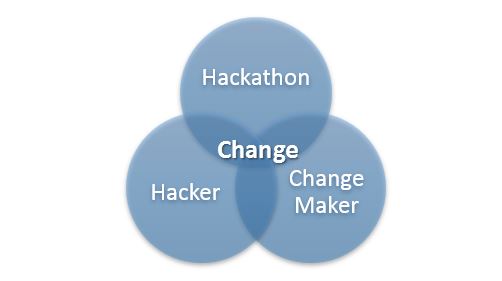
As a species, we spend over 199 human lifetimes each year watching Netflix. Investing your time in an event like a hackathon requires one of the weekends you have each year and may inspire you to make more of your remaining 52.
- If you have an idea for social change…
There are a lot of ideas for change out there. The RHoK process can get you plugged into people who can help validate and realise those ideas. If you have an idea that has a technical element, consider applying for a hackathon such as Random Hacks of Kindness. - If you want to lend a hand and a hack…
You do not need to be a programmer to help out (but if you are you will be most appreciated). There are great posts out there by those who have hacked before to get you prepared. If you want to be a part of a team making a difference, consider registering as a hacker at an upcoming event. - If you want to introduce change in your region…
Something like a RHoK event builds local community and fosters innovation. The event can be effective when considered as part of a holistic approach that includes local community, sponsors, and commercial partners. The hackathon approach has matured and there are a lot of resources similar to the Hack Day Manifesto to make starting a new event easier. If you are considering ways to hack your community or corporation, feel free to connect with me through LinkedIn to have a chat and we can see about connecting you with people who can support your ideas.
Hackathons are not the answer to everything, but they do align common intent that spans different schools of thought and build momentum for further change.
If you have had your own hackathon, I would love to hear about them in the comments below!
Image credit: Esther by Amanda https://flic.kr/p/51FS5m

Hi Chad, great blog! I learnt a lot about hackathons from the thoughts and links you shared.
It was inspiring to be a part of the Random Hacks of Kindness event, and to make new connections and work together with like minded people who had been strangers before the event. A big thanks to you and everybody who contributed to the work on Gifts4Good and to the other projects.
Regards, Alison.
Thanks Alison! It was great to see you there and hear about your bold plans for Gifts4Good!
Chad